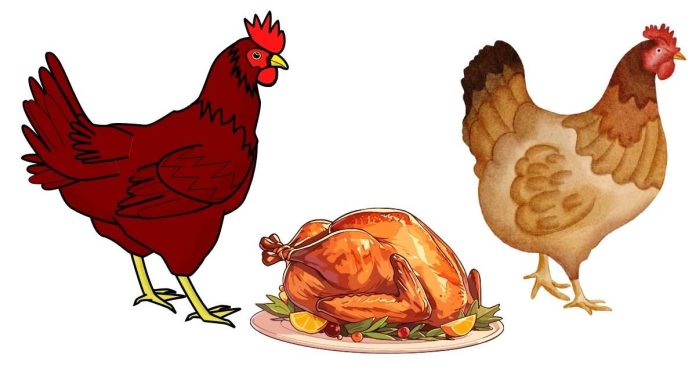When discussing poultry, the terms “chicken” and “hen” are often used interchangeably, but there are subtle distinctions that can affect the flavor, texture, and culinary uses of the meat. Understanding these differences can help you make better choices for your meals and recipes.
This article looks at the key differences between “chicken” and “hen” meat, including how they are sourced, their culinary characteristics, and their ideal uses in cooking.
Chicken vs. Hen: The Basics
Chicken
- Definition: “Chicken” is the general term used to describe meat from domesticated birds of the species Gallus gallus domesticus.
- Age: Typically refers to younger birds, such as broilers (6-8 weeks old) and roasters (8-12 weeks old).
- Meat Characteristics:
- Flavor: Mild and neutral, making it versatile for a wide variety of recipes.
- Texture: Tender and less fibrous due to the young age of the bird.
- Fat Content: Moderate, contributing to its juiciness and flavor.
Hen
- Definition: A “hen” is a mature female chicken, often 12 months or older, that has laid eggs.
- Age: Older than the chickens commonly sold in grocery stores.
- Meat Characteristics:
- Flavor: Richer and more robust, sometimes described as gamey.
- Texture: Firmer and more fibrous, requiring longer cooking times to tenderize.
- Fat Content: Typically leaner, as the bird has expended energy laying eggs.
Culinary Differences
Chicken Meat
- Ideal Cooking Methods:
- Grilling, roasting, frying, and sautéing are excellent for chicken due to its tender texture.
- Quick cooking times make it suitable for dishes like stir-fries and cutlets.
- Common Uses:
- Popular in global cuisines, from fried chicken and chicken curry to chicken Caesar salad.
- Availability: Widely available in supermarkets and often sold as whole chickens, breasts, thighs, wings, or drumsticks.
Hen Meat
- Ideal Cooking Methods:
- Best suited for slow, moist-heat cooking methods like braising, stewing, or making soups and stocks.
- Pressure cooking is also effective for tenderizing hen meat.
- Common Uses:
- Traditionally used in dishes like chicken soup, coq au vin, and other recipes that benefit from its deep flavor.
- Often preferred for creating rich broths and stocks.
- Availability: Less common in standard supermarkets but often found in specialty stores or butcher shops.
Nutritional Comparison
| Nutrient | Chicken (Younger) | Hen (Older) |
|---|---|---|
| Protein | Slightly lower due to higher fat content. | Higher, as mature birds develop denser muscle. |
| Fat | Moderate, adding to juiciness and flavor. | Lower, as hens are leaner due to egg production. |
| Calories | Slightly higher per serving. | Lower due to reduced fat content. |
When to Choose Chicken or Hen Meat
- Choose Chicken When:
- You need quick-cooking, tender meat for dishes like grilled chicken or stir-fries.
- You’re preparing meals where a mild flavor is preferred to let sauces or marinades shine.
- Choose Hen When:
- You’re making soups, stews, or broths that require a richer, more complex flavor.
- You have the time for slow cooking or pressure cooking to tenderize the meat.
While “chicken” and “hen” meat come from the same species, their differences in age and life stage result in distinct culinary characteristics. Chicken meat is tender, versatile, and mild in flavor, making it ideal for quick-cooking recipes. Hen meat, on the other hand, offers a deeper, more robust flavor and is best suited for slow-cooked dishes and stock-making.
Understanding these differences can enhance your cooking by allowing you to choose the right type of poultry for your specific needs. Whether you’re crafting a rich stew or grilling a quick weeknight dinner, selecting the appropriate meat ensures the best flavor and texture for your dish.


